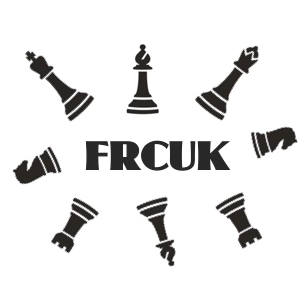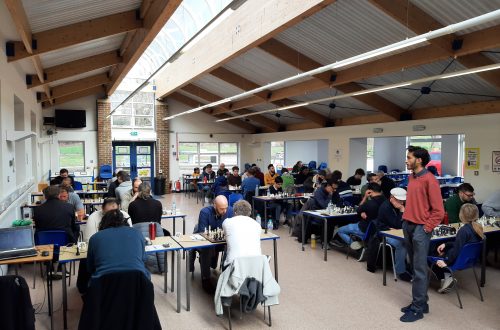
My first Chess960 tournament
Last weekend, the 5th International Chess960 Festival was held at Kreuzberg Chess Club in Berlin. The event is open to anyone wishing to give Chess960 a go and this year incorporated the 1st official German Chess960 Championship.
A whopping prize fund of €10,000 naturally attracted titled players and plenty of people from abroad, including my fellow Chess960 fanatics at FRCUK, Thomas Quilter and Evangelos Kostopoulos, who managed to persuade me to enter my first ever competitive Chess960 event.
There was also a live commentary team consisting of Elisabeth Pähtz (GM) and the President of the Berlin Chess Association, Paul Meyer-Dunker, who were streaming the event in German to the world-wide web.
A full report in German, including photos, can be found on the Kreuzberg Chess Club’s website.
The Berlin event was held in parallel with the G.O.A.T Freestyle Chess spectacular. “Freestyle Chess” is a new term for Fischer Random Chess or Chess960.
Pre-tournament nerves
It’s normal to have one or two nerves going into any competitive chess event but I was slightly more nervous than usual.
- Was I going to struggle with having to calculate from move 1? Normally, I’d ease into the game slowly and bash out a few known openings moves, a bit like a warm-up exercise.
- Maybe there’ll be people there with more Chess960 experience than me, who will understand some of the subtleties and feel more confident playing moves like 1.g4! ?
- Am I going to remember how to castle?
- How embarrassing would it be if I end up getting completely smashed off the board?
Well, a couple of those things did happen. I lost one game to the eventual winner, Sergei Azarov, in 11 moves! And, I had to check once with an opponent whether castling was permitted, worried that I might play an illegal move. Both of these things weren’t a big deal. Don’t get me wrong, I wouldn’t want to be checkmated again in 11 moves, or even 22 moves for that matter, but my opponent’s defensive and attacking move that lead them to victory was one of the coolest anyone has ever played against me, and to plan it in advance made it even more impressive.
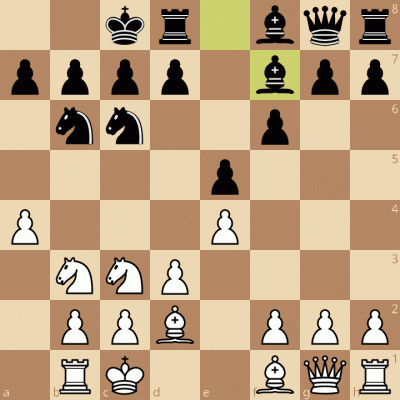
Black just played the natural-looking 6…Bf7. I’d purposely delayed castling to potentially line-up a dangerous attack down the a-file in case my opponent decided to castle queenside themselves first. Surely the knight having to retreat to a8 wouldn’t be too bad for me? I also thought about even playing Nd5, if necessary, to sacrifice a pawn for a quick attack, fianchettoing my light-squared bishop, and finally playing f4 to open up the g1-a7 diagonal for Her Majesty.
Check my 2nd round game from this Lichess Study to see what happened.
Recording Chess960 games
Most players didn’t record their games and those playing on top ten live boards didn’t need to anyway. In terms of time management, it probably wasn’t a good idea to record my games, but I was curious to see how scoring worked for Chess960 and I thought I might like to analyse my own games before or after the tournament.
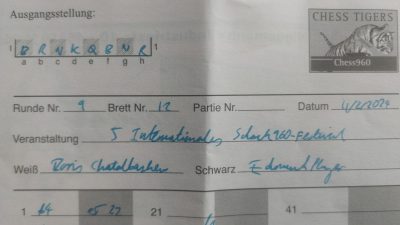
So how does scoring work? The only difference is the addition of recording the starting position (Ausgangstellung), which is easily forgotten and not that trivial to reconstruct, once the game has finished. Some of the scoresheets contained a nice little area to write down the start positions for each game. Another option would be to record the official Chess960 starting position number (1-960) on the scoresheet, which the organisers were shouting out before each round.
No preparation
Love it! I hate preparing for games. I believe that organisers of normal chess tournaments should publish the pairings just before each round to make it harder for players to prepare. Some standard play tournaments these days contain two rounds per day, and when you have to add preparation on top, you are looking at around a maximum of around eight hours playing time, plus another 1-2 hours of preparation (some players use up even more energy on preparation than me).
I’d much rather spend that time discovering the place where the tournament is located or doing something more relaxing. If I were to do any preparation, it would probably just involve some warm-up exercises like attempting to solve one or two puzzles or studying an interesting endgame position.
Chess960 tip
Another thing I learnt was that when the King and Queen start on opposite squares, it’s extremely confusing. In fact, my opponent – Boris Chatalbashev (GM) – said after the game that he castled as soon as possible because he kept getting confused himself that the royals had swapped positions. I was on the verge of losing the game anyway because of developing my knight in an awkward manner, but suddenly I couldn’t believe my luck thinking my opponent had gifted me a way back into the game, but after they quickly snapped off my knight on g5, it suddenly dawned on me that my Queen wasn’t on d8 – ouch!
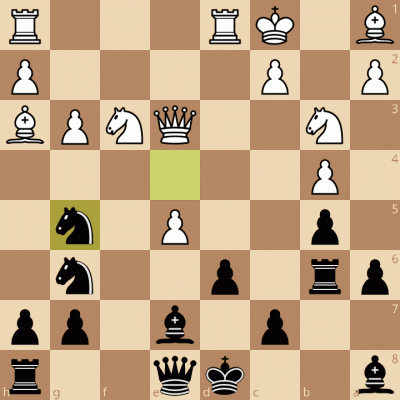
Junior participation
One thing I noticed is that there were hardly any junior players in the event. Perhaps juniors are content learning normal chess and don’t feel the need to play Chess960 yet? Maybe the big tournament in North Germany, which has had a huge amount of marketing and publicity might influence more juniors to consider Chess960 tournaments in the future. Young superstars like Vincent Keymer, Nodirbek Abdusattorov, Dommaraju Gukesh and Alireza Firouzja, plus Magnus Carlsen of course, will surely have a big influence on how things pan out. Also, if more established players like Levon Aronian continue to vocally support Chess960, it won’t do any harm either and might encourage more chess players from earlier generations to give Chess960 a chance. Perhaps chess parents aren’t that familiar yet with the format either, so aren’t sure whether it’s worth entering their children into a Chess960 event. Therefore, I think it is a good idea for junior chess organisers to throw in Chess960 from time to time.
Fresh ideas
The Kreuzberg Chess Club was established in 1949 and is located close to the block of flats with the artwork, which I took the random photo of whilst a yellow U-Bahn train sprinted by. The club has an extensive chess library and a bar/kitchen area with black and white chequered, chess-board-like, tiles. Despite being a very old club with many traditions, they had a lot of fresh ideas to make the tournament more fun and comfortable for everybody taking part.
In the opening ceremony, the organisers made everyone feel very welcome and even went to the extent of offering everyone free ginger shots to boost the players’ immune systems.
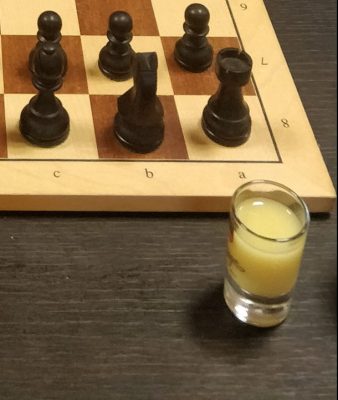
The 25 minute plus 30 seconds per move time control was so much fun! This meant that some of the games lasted up to around 1.5-2 hours, so the time control was somewhere between rapid and standard play. Because of the 30 seconds being added per move, I felt that the quality of the games compared to a standard rapid time control, of say 15 minutes each plus 15 seconds per move, meant that I had a bit more time to find a winning combination/motif and wasn’t going to be ‘flagged’ so easily. Another advantage to this tempo was that the organisers could pack nine rounds into the schedule. The more games, the quicker you learn.
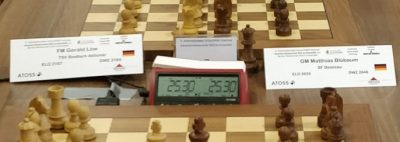
Summary
The Berlin event was so much fun and I will definitely play again or in a similar event in the future.

The final standings can be found on the Chess-Results website.
One thing that Chess960 doesn’t have yet is an official Elo system to recognise a player’s Chess960 ability. There does seem to be a lot of correlation between the performances of each player in the Berlin event, so it might be possible to recognise Chess960 events for the Elo system that currently exists, but this would probably ‘cross the streams’ a bit too much, and might not work in favour of any ‘opening specialists’, so I guess having a separate Chess960 Elo, like in online chess platforms, would be the way to go.
If more of the top players in the world participate in freestyle chess and sponsorship continues, Chess960 will gradually become more and more accepted and understood by the chess-playing world.

